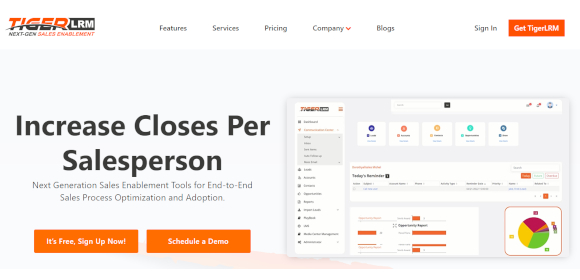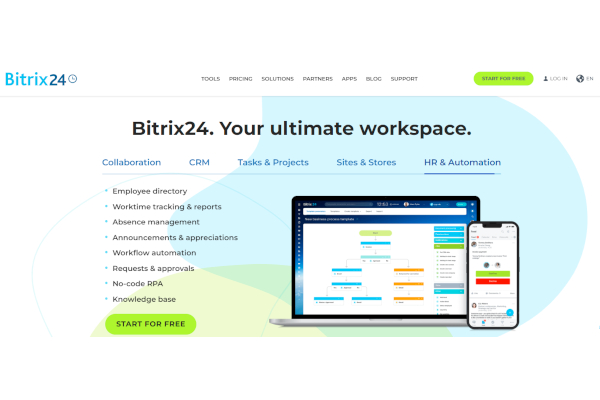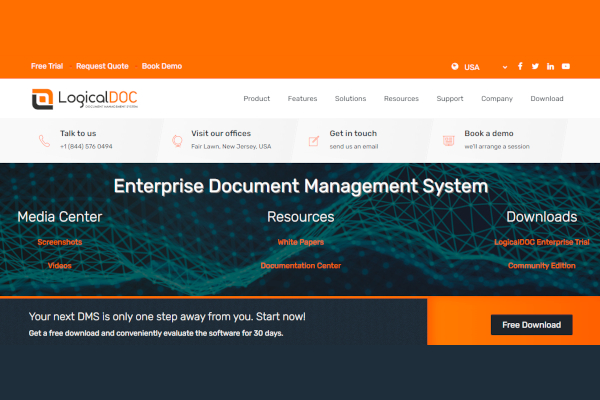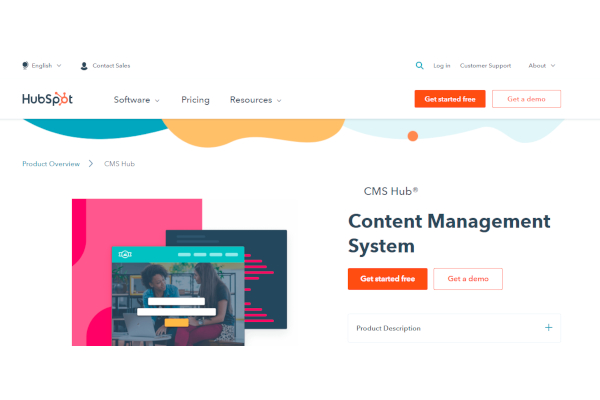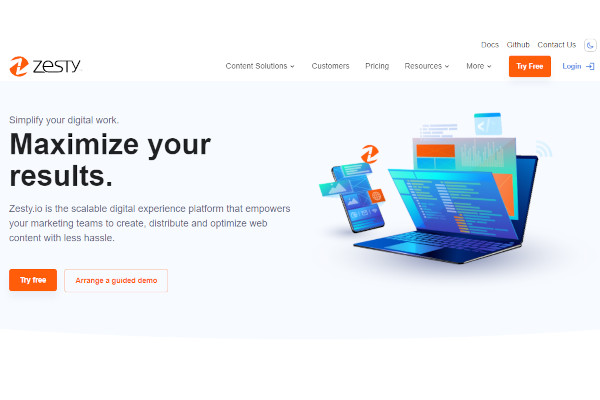Content management systems facilitate the administration and dissemination of web-based content (CMSs). Without a content management system (CMS), building a website and putting information online requires coding skills.
Yet, most CMSes make website development possible even for those who are not fluent in HTML or CSS. In this article, we’ll take a closer look at the many CMS options now on the market, and how they each serve certain user populations with varying levels of technical proficiency.
10+ Best Free Content Management Software
1. Bitrix24
2. Flipsnack
3. Publitas
4. LogicalDOC
5. HubSpot CMS Hub
6. Contentful
7. Kontent.ai
8. Zesty.io
9. Docsie
10. TigerLRM
11. Storyblok
What Is Content Management Software
Web content management systems facilitate the production, revision, and distribution of digital information, from text to interactive graphics and videos. The tools of a CMS may also index information for speedy retrieval and present it in a way that is unique to each user.
With the help of the WCMS platform’s thematically-oriented design templates, even users who lack coding skills may easily upload and generate content. Hence, anybody may publish online since there is no longer a need for technical people (or HTML experts).
Benefits
There are several ways you may gain from adopting WCM software, namely:
- Reduced expenditures.
The cost of a Content Management system is often high. Sometimes, the advantages of utilizing it much exceed the expenses, and it may even be made available for free or with a subscription. - Modest User Interfaces
When it comes to content production and updating, the vast majority of CMS features are meant to be user-friendly even for those without technical expertise. - It’s simple to adjust to your own requirements.
The standardized interface of a CMS let even unskilled users create and deploy highly customized front ends with ease. - SEO (Search Engine Optimization)
CMS provides you with the tools you need to optimize your site for search engines. With a content management system, you can simply and rapidly write high-quality material that makes good use of keywords, metadata, and anchor texts.
Features
CMS provides collaborative writing capabilities for usage by numerous users and servers. The advertising platforms, extra CMS tools, and content analysis programs may all be integrated with certain CMS systems. Others may provide simply a few more services, such as website creation and digital asset management. CMS systems generally share features with enterprise content management (ECM), digital experience platform (DXP), and ecommerce platform (P) software.
Top 10 Free Content Management Software
1. WordPress
WordPress is among the most well-known and privileged open-source content management system (CMS) options available on the market today, if not the most.
2. Joomla
It is regarded as one of the most cutting-edge website creation tools available today. You’ll end up having a lot more in return after you master it, despite the fact that it’s not the easiest thing to get used to at first.
3. Drupal
Drupal is another another option available to you. It was established all the way back in 2001, and it is well-known for maintaining enormous websites that include a significant number of articles and webpages.
4. Concrete5
This might be an excellent alternative for those who wish to begin with a straightforward website that has a lot of material and utilize that website as the foundation for a lively community. The following are a few arguments in favor of giving this CMS more thought:
5. SilverStripe
The SilverStripe Content Management System (CMS) is one of the more recent entries on this list. Moreover, it is a CMS that is open source. In spite of the fact that it is a relatively new platform, it has already established a solid customer base in several countries.
6. CMS Made Simple
There’s more to this CMS than meets the eye, as is the case with many others. Has a lengthy history, but, strangely, little mainstream recognition. It has a lot of cool, useful features that expand its usefulness and adaptability.
7. ExpressionEngine
While the core CMS is free, there are also a couple commercial variants available for $99. This content management system differs from the others on the list primarily in that it makes use of templates to determine the looks of websites.
8. Wix
Wix is a free website creation platform; however, since the site is design-driven, it is not regarded to be a true content management system (CMS).
9. Microweber
It is a simple tool that may help you organize your stuff quickly. It can be integrated with e-commerce platforms, but only with a few basic functions.
10. PyroCMS
A content management system that has been under development since 2015. It aims to streamline and simplify the process of making a website.
FAQ
What makes CMS important to companies?
With a CMS, businesses may increase the number of potential customers that visit their website (CMS). On top of that, CMS provides uniformity, which is vital for winning over an audience, satisfying customers, and raising brand recognition.
Can web design integrate CMS?
A content management system (CMS) gives its users the tools they need to control and distribute their own website content without the aid of a coder.
Is CMS effective?
With a competent CMS, you may offer your material in a variety of unique ways. The major goal of most content management systems is to make it easier for people with varied levels of technical competence to create and modify information.
Some people just don’t have what it takes to master both the front and back ends of web development. Yet everyone can write or shoot anything. Online marketing and business formation are open to everyone with an internet connection. CMS was developed to make this kind of thing possible.
Related Posts
12+ Best Vulnerability Scanner Software for Windows, Mac, Android 2022
4+ Best Bundled Pay Management Software for Windows, Mac, Android 2022
10+ Best Trust Accounting Software for Windows, Mac, Android 2022
10+ Best Patient Portal Software for Windows, Mac, Android 2022
13+ Best Virtual Reality (VR) Software for Windows, Mac, Android 2022
12+ Best Bed and Breakfast Software for Windows, Mac, Android 2022
15+ Best Resort Management Software for Windows, Mac, Android 2022
14+ Best Hotel Channel Management Software for Windows, Mac, Android 2022
12+ Best Social Media Monitoring Software for Windows, Mac, Android 2022
10+ Best Transport Management Software for Windows, Mac, Android 2022
10+ Best Other Marketing Software for Windows, Mac, Android 2022
10+ Best Top Sales Enablement Software for Windows, Mac, Android 2022
8+ Best Industry Business Intelligence Software for Windows, Mac, Android 2022
10+ Best Insurance Agency Software for Windows, Mac, Android 2022
10+ Best Leave Management Software for Windows, Mac, Android 2022
